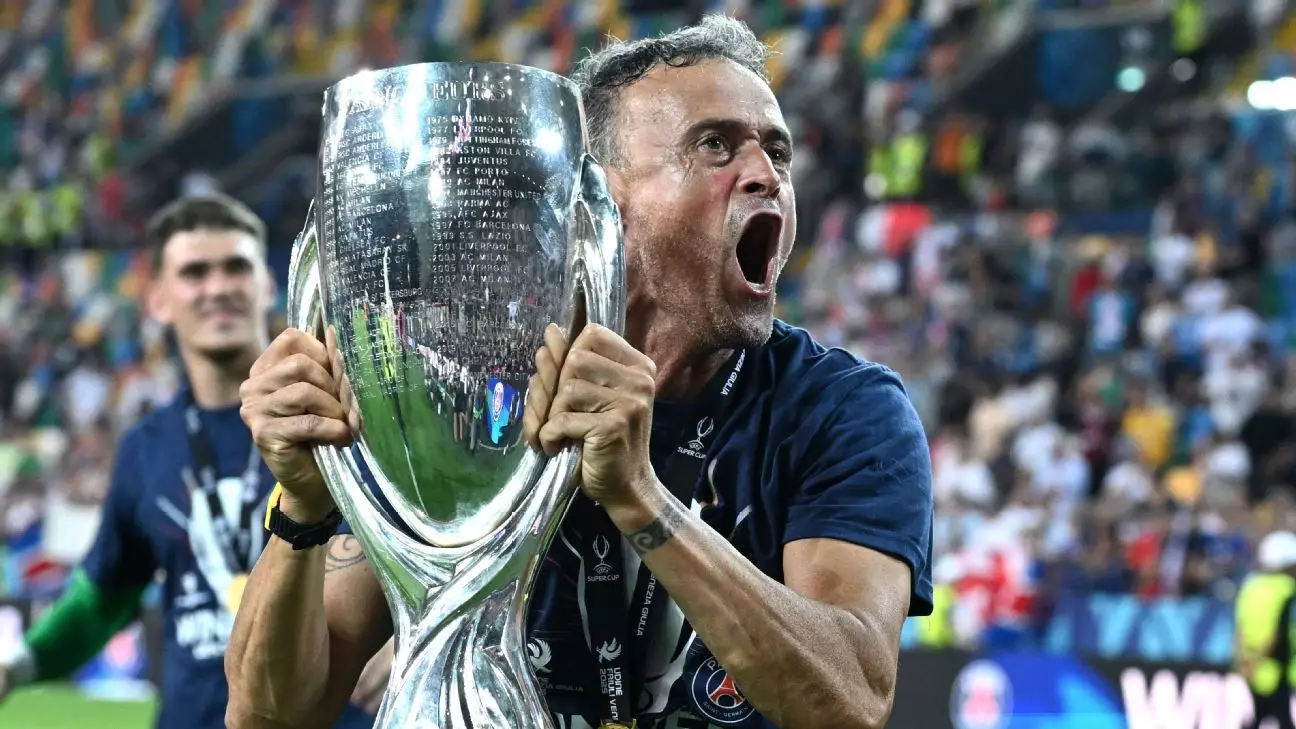In the grand narrative of football, complacency often shadows celebration, and the recent PSG vs. Tottenham Super Cup clash exemplifies this truth. While the headline may read as a dramatic comeback, beneath the surface lies a harsh reality: PSG’s performance was far from deserved. A team that had scant days of training and a goalkeeper making questionable decisions seemed to stumble through the first 80 minutes, seemingly destined to succumb to their opponent’s preparation and momentum. Yet, their unwavering tenacity challenges the myth that skill alone guarantees victory. It’s a stark reminder that resilience, grit, and mental fortitude often outweigh tactical superiority in the crucible of high-stakes football.
The narrative that PSG “didn’t deserve” the win is more than a critique of their technical execution; it questions the very ethos of sporting success. How often do teams chase perfection instead of valuing perseverance? This match underpins a vital lesson: victory isn’t always a reflection of dominance but sometimes the product of refusing to capitulate in the face of adversity. PSG’s late rally—scoring two goals in the final minutes—exposed the fragile assumptions we hold about preparedness and dominance. It’s a testament to the unpredictability that keeps football compelling: sometimes, a team with less fitness and fewer training days can overturn the odds, fueled by collective belief.
The Price of Inexperience and the Power of Mental Toughness
A closer look reveals how critical confidence and mental toughness are in professional sports. Lucas Chevalier’s debut at PSG was marred by errors—an early goal conceded after a save that was just out of reach, another mistake that led to Tottenham’s second. These missteps could have shattered his confidence, affecting the team’s morale. Instead, Chevalier’s resilience in saving a penalty in the shootout showcases a burgeoning personality willing to confront pressure head-on. His performance underscores a crucial insight: in football’s high-pressure moments, psychological resilience often eclipses physical skill.
The game’s narrative also highlights the fluid nature of momentum. Tottenham, dominant in the final quarter of regulation, appeared poised to secure victory. Yet, PSG’s persistence altered the story. Lee Kang-in’s fierce shot injected hope, and Gonalçalo Ramos’s stoppage-time equalizer transformed despair into elation. The victory through penalties—despite initial setbacks—shattered the illusion that talent and form alone determine outcomes. Instead, it confirms that mental agility, team cohesion, and unyielding faith sustain teams through adversity. PSG’s comeback is a testament to how a culture that values perseverance over perfection can elevate even the underdog.
Leadership and the Art of Maintaining Composure
Amid the chaos, the leadership within the PSG squad revealed its importance. The resilience displayed during the shootout, where players kept their nerves and converted penalties, speaks to an ingrained belief system. Even those who faltered initially, like Vitinha, demonstrated commitment by rallying to support teammates. Such collective mental strength fosters a resilience that transcends individual skill, embedding itself into the team’s identity.
The departure of Gianluigi Donnarumma added a layer of narrative complexity. With a seasoned goalkeeper watching from afar, Chevalier’s debut was laden with pressure—a crucible in which true character is forged. His performance, marked by determination and, ultimately, a crucial save, exemplified that leadership and poise are cultivated through adversity, not comfort. This game illuminated a vital truth: in high-stakes scenarios, true leaders emerge not just through their technical prowess but through their capacity to absorb pressure, inspire teammates, and maintain focus amid chaos.
The Unforgiving Arena of Modern Football
This encounter also prompts a reflection on modern football’s relentless nature. The emphasis on fitness, tactical discipline, and preparation is undeniable. Tottenham’s six-week training lead gave them advantages in organization and rhythm, yet it wasn’t enough to prevent a collapse. PSG’s brief window of training—just days before the match—serves as a stark reminder that in football, mental resilience often beats physical readiness. The game demonstrates how luck and unrelenting spirit can overturn meticulously crafted plans.
Ultimately, this match challenges the simplistic notion of victory as a mere outcome of skill and preparation. It celebrates the unbreakable human spirit engaged in a game that, at its core, is unpredictable and deeply emotional. PSG’s dramatic comeback redefines what it means to succeed: not by flawless execution, but by the refusal to accept defeat, no matter the odds. In football, as in life, resilience remains the ultimate power.


Leave a Reply